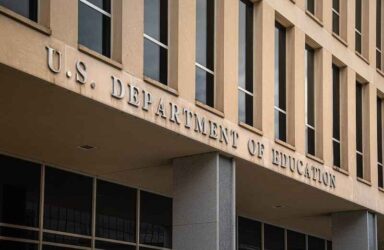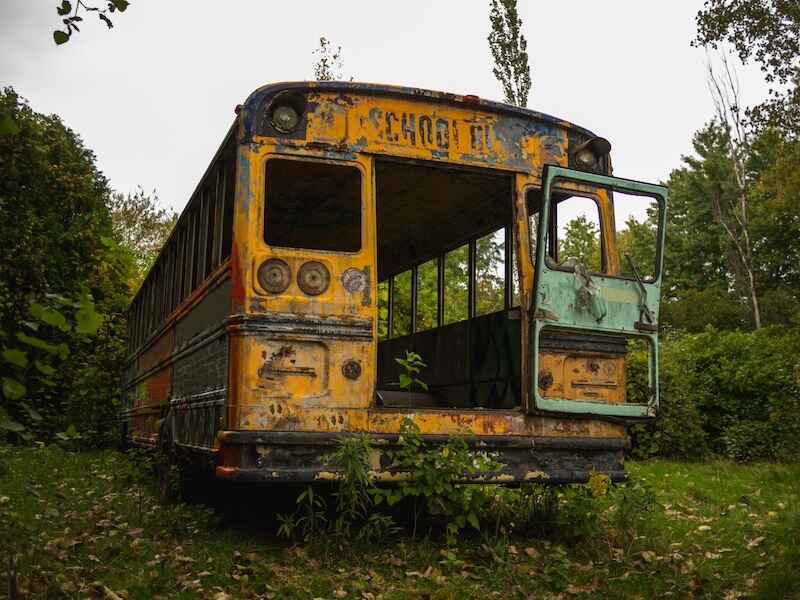A Track Record No One Should Trust
Joel Salatin|July 20, 2024

I received a conservative Republican’s donation request this week. His platform includes the need for better schools as a better taxpayer value.
Of the many political pleas I’ve received over the years, I don’t think I’ve ever seen a platform that said “abolish government schools.”
Why?
For nearly two centuries, our republic functioned without government schools… and the literacy rate was higher than it is today.
Federal involvement did not start until the U.S. Department of Education was born in May 1980.
Can you believe our nation survived from 1776 until 1980 without federal meddling in education?
A Fight for Independence
Politicians’ inability (except for some libertarians) to imagine a world without government-sponsored education shows how far removed we are, as a society, from creating private solutions.
I’ve been asked many times by well-meaning people to run for office. I always respond that I’m unelectable. That always surprises them, because these are folks who like me.
“I’m opposed to government schools,” I’ll say, nonchalantly. Then I watch their faces contort as they think about how such a message would go down.
If privatization were opposed just by the teachers’ unions, that would be one thing. Even probably winnable. But it’s nearly universally opposed across the country, which makes such thinking suicidal.
Americans’ ability to imagine a free market working is almost nonexistent. The average person can’t imagine a society without building inspectors, food safety inspectors, workplace inspectors, automobile inspectors… the list could go on and on and on.
That a sophisticated society like ours could function without a bureaucratic, technocratic, regulatory structure is impossible for most folks to imagine.
“Won’t houses fall down?” “Won’t people get sick from bad food?” “How will kids learn to read?” “How do we keep jalopies from crashing into people?”
Government meddling and oversight is such a part of our daily lives that imagining free market solutions – that good products naturally succeed while bad ones fail – puts you on a different planet.
We’ve given up on the ability of unregulated markets to satisfy our needs. It must be the market plus government involvement. It must be business plus government bureaucracy.
Even extremely conservative- or libertarian-minded folks fear saying the obvious: unregulated markets create their own oversight through customer response.
Diminishing Returns
In 1910, backyard mechanics cranked out 1,500 brands of automobiles. This dynamic, innovative petri dish gradually slimmed to a dozen by the late 1930s until it finally became the Big Three by 1970.
This wild west mentality is not something to fear. It’s something to embrace because ultimately it’s the secret sauce to unleash imagination and creativity.
And if the federal government had not gotten involved in the automobile business, perhaps we’d still have a dozen domestic brands today.
Few beliefs destroy more hopes, more ambition, more creativity than the notion that some bureaucrat must approve and license whatever we grow, build, or fix.
A great lesson comes from the current military situation in Ukraine and the Middle East. I’m fascinated these days by the battlefield advances being cobbled together by tiny teams building drones and other cheap, miniature, but lethal weapons.
While the U.S. builds billion-dollar airplanes and ships, these front-line innovators, working with almost nothing but their imagination and a few bucks, are wreaking havoc on conventional military mega-infrastructure.
The Ukrainians are sending the entire Russian navy fleet scurrying by dispatching remote-controlled 200-pound boat drones. These outfits are successful not in spite of being small and nimble, but because of being small and nimble.
When Joel Arthur Barker wrote Paradigms and popularized the word, one of his tenets was “every paradigm eventually exceeds its point of efficiency.”
Think about how many things in our world may have exceeded their point of efficiency. Factory farms. Drugs. Federal oversight.
Rough and Tumble
Here’s how far my privatization belief goes…
How about a completely unfettered social media?
In other words, if it is not a private business and enjoys utility exemption, then it should not be censored. The electric company doesn’t ask what I’m using power for. The water company doesn’t ask why I’m using water.
So if people spew hate speech, show how to build a bomb, or explain the finer points of homemade methamphetamine, go ahead.
By the same token, we wouldn’t have any safety net for healthcare, including mental health.
Without government schools to offer first-time drug use (half of all first-time illicit drug use occurs in public schools) perhaps we could cut that societal problem substantially. And those who fell into that problem might die. Okay, weed them from the gene pool. That’s what farmers do with dysfunctional cows. While that sounds harsh, what’s worse is destroying the producer class to hold up the dysfunctional class.
If we could all keep 90% of what we pay in taxes, we’d have far more capacity for philanthropy and creating voluntary rather than coercive safety nets.
Such a “rough and tumble” world sounds horrible to many. Seat belts. Motorcycle helmets. Mandatory vaccinations. How could we live without these things?
Very well, actually.
All About Trust
We’d learn to make decisions more responsibly. We’d learn to rely on each others’ experiences with products and services. We’d have private certifying agencies, all functioning at will.
Perhaps some kids wouldn’t read. Right now, lots of kids can’t read in our failing schools. Money won’t help. The solution is to get the government out of the nanny business and put us in charge of our own lives.
Babysitting is something you grow out of… not something you grow into.
Conservatives should not be apologetic about getting the government out of our mouths, our homes, and our decisions. We can aggressively push for privatized, liberty-centric options to a society shackled by government overlords.
Few things are more disempowering than to assume we need a government official. If the marketplace wants something, someone will figure out how to find it.
In the end, it’s all about trust… and the government doesn’t have a good track record.
Let’s try free markets and liberty for a change.

Joel Salatin
Joel Salatin calls himself a Christian libertarian environmentalist capitalist lunatic farmer. Others who like him call him the most famous farmer in the world, the high priest of the pasture, and the most eclectic thinker from Virginia since Thomas Jefferson. Those who don’t like him call him a bioterrorist, Typhoid Mary, a charlatan, and a starvation advocate. With a room full of debate trophies from high school and college days, 12 published books, and a thriving multigenerational family farm, he draws on a lifetime of food, farming and fantasy to entertain and inspire audiences around the world.



